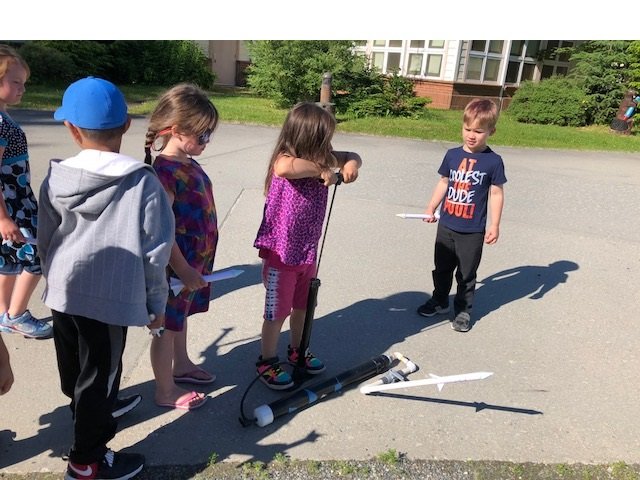Summer Learning: Reclaiming Summer Break for Alaskan Children
This season across Alaska, children are participating in camps and activities that boost confidence and prevent summer learning loss. Without continued engagement, students may start the new school year at lower academic achievement levels. Enrichment programs fend off the summer slide by helping youth maintain academic abilities, get involved with their communities, embark on outdoor adventures, or try out new areas of inquiry, such as hands-on STEM (Science Technology Engineering and Mathematics).
The gap in learning becomes pronounced for those from lower income families. With less access to summer opportunities, kids can fall behind their affluent peers by up to two grade levels through elementary school, decreasing chances of earning a high school diploma or achieving other markers of lifetime success. For students prone to summer setbacks, summer programs ensure academic gains and growth in key areas of resilience. Along with providing great experiences, these programs also help working parents when school lets out for the season.
For National Summer Learning Day July 12, 2018, Alaska Afterschool Network recognizes the caring professionals who provide quality summer learning opportunities, and we applaud the children who are making great strides and opening doorways to lifetime achievement. From making connections to building trust, the benefits of summer learning can be seen in these dedicated youth programs. To celebrate Summer Learning Day, here are three outstanding summer programs in Alaska that keep kids safe, inspire summer learning, and support working families:
L.E.A.P. Summer Camp at Riverbend Elementary; Juneau, AK
During summer break the Learning Enrichment Afterschool Program (L.E.A.P.), a federally funded 21st Century Community Learning Center, hosts a six-week camp to bridge the gap for students from Riverbend Elementary School who are at risk of increased learning loss when school lets out. L.E.A.P. Summer Camp provides holistic instruction in literacy, STEM, and enrichment that shows clear results among kids who attend—from improvements in academics and behavior, to family engagement.
On any given day of Riverbend’s L.E.A.P. Summer Camp, students can be found starting off the day with hot breakfast and a motivational group exercise, followed by learning blocks in literacy, math, and a variety of engaging experiences. Certified teachers help students reach goals, while partners (e.g. USDA’s Farm to School Program and local Discovery Southeast) supply enriching materials and activities in subjects such as garden management, STEAM (Science, Technology, Engineering, Arts and Mathematics), physical education, or connecting with Alaska Native Culture. Each year’s camp focuses on a theme, which encourages students to make connections between academic and enrichment activities.
Now into their fourth year of hosting L.E.A.P. Summer Camp, Riverbend (along with Glacier Valley Elementary) offers solid youth programming in Juneau, recognized by parents as an opportunity “to build confidence” and “a positive summer experience that can help foster a love of learning”.
karen.goodell@juneauschools.org
Summer Adventure Program, Camp Fire Alaska; Anchorage, AK
A mainstay of youth programs, Camp Fire Alaska offers three core summer options in Southcentral Alaska: overnight Camp K at Kenai Lake, Camp Si-La-Meo on the campus of Alaska Pacific University, and the Summer Adventure Program (licensed care at select schools in Anchorage and Eagle River). The Summer Adventure Program inspires local youth to enjoy structured activities focused on topics like entrepreneurship (Lemonade Day Alaska), STEM, and art. Campers are encouraged to try out new skills, challenge themselves, and build healthy relationships by participating in theme weeks, community involvement, and a variety of projects and field trips.
Professionally trained staff promote self-awareness and responsible independence among campers, as well as social and relational skills that center on empathy and conflict resolution. Kids are encouraged to develop helpful behaviors through Social Emotional Learning (SEL), while making positive choices is rewarded with participation in weekly field trips (e.g. trips to a local park or swimming pool).
As an important extension of Camp Fire’s Before and After School Programs, Summer Adventure encourages students to stay involved and engaged during time away from school. As an accessible, licensed school-age program that runs throughout the season, Summer Adventure also serves as a staple of support to working families during the summer months.
For more information:
Culture Camp, Curyung Tribal Council and Bristol Bay 4H; Dillingham, AK
Supporting the Curyung Tribal Council’s vision for wellness, this summer youth program is a key part of the Curyung Community Prevention Plan. Curyung Tribe's 4H Club hosts two sessions of this three-week long Culture Camp each year. During the summers, elementary school age campers participate in Alaska Native cultural learning, Outdoor Education, and community-sponsored activities that help kids feel safe with providers and professionals from local agencies. Culture Camp also cultivates leadership among youth, so former campers have become interns and adult leaders within the program. This built-in mentorship reinforces traditional values of caring for others, and responsibility to the larger community.
Trips to the boat harbor focusing on local fisheries mingle with lessons on marine stewardship. Outdoor sessions about native plants culminate in salve-making workshops. Campers learn Alaska Native arts and crafts, practice Native dance, and participate in processing the salmon harvest. At the end of camp, a community celebration is held where youth perform Native dance and honor their elders with gifts of carefully-made salmon products and healing salve.
Curyung Tribe’s 4H program also extends to remote communities in the Bristol Bay region. Later this month, a liaison will bring Culture Camp to the children of Goodnews Bay, at the village’s request. The Alaska Afterschool Network wishes the community all the best for their new camp venture.
For more information:
http://www.alaska4h.org/bristol-baydillingham.html
Quality summer programs can broaden youth horizons, especially for those at risk of summer learning loss. The programs stimulate new interests, inspire creativity, and build strengths in safe, nurturing environments. To make sure all kids start the school year at an advantage, more support is needed for summer camps that emphasize reading, STEM, structured arts programs or recreational activities. Expanded access to year-round enrichment has the potential to turn summer break into summer breakthrough for more Alaskan families.






